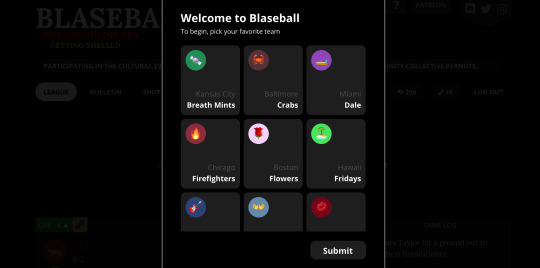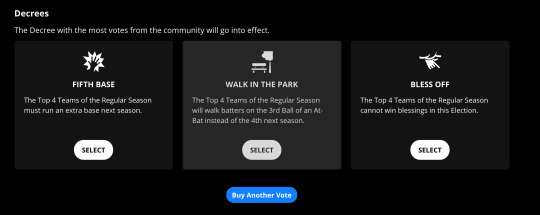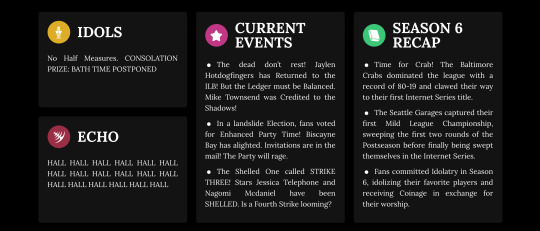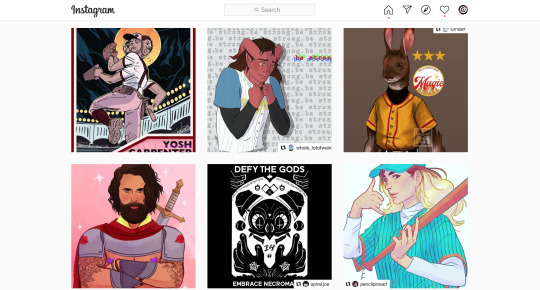#but literally any pokemon can compete in any category
Text
contest spectaculars are for EVERYONE!! theres a reason that there are ranks!! if you gatekeep pokemon contests to people with experience or if you think only certain pokemon can compete in certain categories we cannot be friends im sorry
#its a whole thing. but the number of times ive been told that blue isnt beautiful enough... i know u go to contests to see like beautifly#or gardevoir#but literally any pokemon can compete in any category#dont you like variety. dont u love seeing how a normal type furret can best psychic types in cleverness#pokeblog rp#pokeblogging#pokeblr#pokemon#rotomblr#contest posting
10 notes
·
View notes
Text
Fossil, Artificial Pokemon, Legendary, and Mythical Pokemon
Hello again, and welcome to today’s topic: exception Pokemon. Today we’ll be looking into the Pokemon that don’t really fit into any natural categories and that require a bit of explaining for their existence in our world.

Let’s first talk about fossil Pokemon. First, I’d like to go as far as to say that fossil restoration could still be a functioning aspect of our “real-world Pokemon au.” If we had the technology to turn animals into light and code to store them in fruit, balls, and computers, then I think we’d be capable of bringing back the dead. Except, that isn’t exactly what’s occurring. Fossil restoration seems to function more as cloning rather than resurrection, so we can recreate the species, but not the soul of the dead Pokemon.
Bringing back an extinct species would be a recipe for disaster on ecosystems if unregulated. Natural pre-existing species would have to compete with the species that should have been long gone, and whole food-chains could collapse as a result, much like how invasive species can destroy a lake or forest. I’d like to posit that either states or countries would have a cap limit on the number of fossil Pokemon that could be resurrected or bred at one time as a way of preventing an out-of control-population. Owners of fossil Pokemon would have to keep certificates, much like birth certificates, to prove that they have the legal right to their Pokemon partner and that their Pokemon was not obtained on the black market. To further limit overpopulation, there’s the possibility of fossil Pokemon requiring sterilization if they are to be used by a trainer to prevent said breeding.

Here, we again have a situation where anyone could have the capability of having a rare Pokemon, but scarcity still remains an issue. For a limited species, the most likely avenues to accessing a fossil Pokemon would probably be through the sciences, like being a professor or archaeologist, individual exploration to find one’s own fossil to restore, or through being the highest bidder to gain a fossil Pokemon as a status symbol. If a trainer wished to release a fossil Pokemon, there’d have to be a safe area of these Pokemon to exist. Like I mentioned earlier, releasing new Pokemon into an unnatural ecosystem would be dangerous. So, there’d be fossil Pokemon parks (Yes, like Jurassic Park), but not simply for cash-grab reasons. These areas would function more as sanctuaries and learning centers than an amusement park.

Artificial Pokemon, although strange in origin, would most likely still exist with just slightly changed backstories. There’s not much that I can say here where there’d be a great divergence from the canon. Pokemon like Porygon, Voltorb, and Trubbish would keep similar origins, but for Pokemon where their origins are cited directly to a certain event such as with Mewtwo or Type: Null, the waters become muddied. I’ve not yet come to a conclusion on whether these Pokemon would then exist at all, but to entertain the thought, I’d try to argue that they could still exist, but would require a different place of birth. Take, for example, Mewtwo. In-game, as far as I can remember, Mewtwo is created as a genetic experiment outside of the influence of Team Rocket, in direct contrast to the anime. Here, we already have discrepancies in the source materials. Mewtwo could still exist in our world, but it would likely have been created as some sort of bio-weapon, and upon a violent escape, the Pokemon would not be recreated. I’d like to imagine Mewtwo as a product of Area 51–just for fun. For Genesect, Type: Null, and other similar Pokemon, I imagine there’d be a similar story.

Mewtwo brings me to the topic of Legendary Pokemon, which range from the Legendary Birds which seem somewhat grounded in reality, all the way to Palkia, Dialga, and Giratina who all serve as literal gods to their respective domains. As a blanket rule, there should be the assumption that these Pokemon are truly legends, and near god-like. Some people may end up worshiping and paying high respect to them, and for others, they’d doubt their very existence. That doubt would be warranted as it would be highly unlikely for these Pokemon to be found. However, this is a general rule and does not apply universally. Dialga and Palkia would in fact probably not be seen for thousands of years at a time, but for Pokemon like the Guardian Deities who interact frequently with people, there’d be a different dynamic.

In my heart, mythical Pokemon–a separate category though similar–would be treated like cryptids. The occasional trainer may claim to get a glance or picture of a passing Celebi, but the skeptical public would regard the evidence as fake. Sightings of mythical Pokemon may be more frequent than legendary Pokemon, but they’d still be incredibly rare. I also love the possibility of mythical Pokemon hunters, like Bigfoot hunters, spending their time following a trail of witnesses to find nothing but a puppet of a Mew in someone’s backyard.
This essay should be the last piece to explain which Pokemon would exist and where in our world. From here on out, we’ll be looking deeper into non-biological elements, logistics, and I hope to begin my exploration of the gym system–my favorite topic–soon. Thank you for reading, and have a wonderful day!
#pokemon#pokemon au#pokemon headcanon#what if pokemon were real#pokemon worldbuilding#pokemon irl#pokemon in real life#a prof hemlock dissertation#fossil pokemon#legendary pokemon#mythical pokemon#cryptids#celebi#hemlock artworks
39 notes
·
View notes
Text
Blaseball: The New National Pastime
Blaseball is my favorite game to come out this year so far, and that’s kind of an odd thing to say considering Blaseball barely feels like a game at all.

Blaseball is a splort in which 20 teams compete under the Internet League Blaseball organization, day and night, rain or shine, and at the behest of us fans who vote to remake the league in our own image.
That’s what the Blaseball FAQ says anyway. Less cryptically, Blaseball is a browser game — a massively multiplayer one at that — in which a league of fictional teams play something vaguely baseball adjacent while we as fans watch from afar through the window of an ever updating list of box scores. We don’t actually play the game — the in-universe game rather — but we are able to participate in a number of ways, like eating peanuts, which...well, I still don’t understand what eating peanuts does, but it’s a thing you can do.

When you first log in to Blaseball, you’re asked to choose a team, with little to go on other than their name and logo. Dallas Steaks, Baltimore Crabs, Hellmouth Sunbeams (wait, where is Hellmouth located?): once you’ve chosen, you’re now a fan of that team and are given a small amount of coins with which to gamble (virtual currency only, this is one of those rare free-to-play games that is actually free.)
And that’s how you’ll be interacting with Blaseball most of the time: betting on the day’s games, Salty Bet style. Every hour, there are 10 games going on, and you can look at the next 10 games starting the next hour and place your bets accordingly. Blaseball developer The Game Band even helpfully puts the odds next to each team’s chances of winning, so you can make an informed decision.
The money you earn from gambling can be spent on a handful of items in the Shop tab, but the most important one is purchasing votes. Votes can then be cast in a weekly election that can affect individual players, teams and the entire league itself. This is where Blaseball truly shines, and it’s what takes it from a relatively straightforward clicker/idle game into something special.

Elections are split up into two categories: Decrees, which are often league-shifting decisions made by majority vote, and Blessings, which are drawn raffle-style to bestow benefits to specific players or teams. An early decree voted upon was “Eat The Rich,” which redistributes the coins of the top 1% of participants to the other 99% at the end of each week/season (Bernie would be so proud.) While a blessing like “Vulture” would let your favored team steal the best hitter in the league and add them to your squad.
Watching the league evolve week to week is engrossing. Elections give fans just that tiny bit of interactivity, tilting the splort in one direction or another, and watching the results with bated breath. It’s a phenomenon I haven’t experienced since 2014’s Twitch Plays Pokemon, and similar to that socially-driven experiment, the community has embraced the game wholeheartedly, creating a deep, crowd-based lore behind every little detail and enhanced by the developers’ sometimes light — and sometimes quite heavy — touch.

After the first season of Blaseball ended, the blessing “Max Out Hitter” gave then-Dallas Steaks’ Jessica Telephone a five-star rating in batting. Fans interacting on the Official Blaseball Discord Channel began to attribute this surge in power to Jessica’s bat, dubbing it The Dial Tone. The Game Band supported this, and by Season 3, where player items were officially added to the game, The Dial Tone now was called out in the box score whenever Jessica came to the plate — and later, on her player profile after fans voted to “lift the Microphone” so they could get to know the players better.
The give and take from developers and fans is a fascinating one. While sometimes the interaction is friendly and collaborative, like in The Dial Tone instance, others have a very SUPERHOT-style antagonistic tone to them (and it doesn’t hurt that they share a similar color scheme as well). An example of this comes from Season 6, where the concept of Idols were integrated into Blaseball. Fans could idolize one player from any team and their accomplishments (hits and home runs for batters, strikeouts and shutouts for pitchers) could net fans extra cash. Jessica Telephone, being one of the best hitters in the league and a fan favorite, easily topped the idol leaderboard. But then, in a targeted form of discipline that’s plagued fans in a variety of ways since Season 1’s opening of the Forbidden Book of Blaseball rules, Jessica Telephone was “Shelled,” literally trapping her inside a giant peanut that skips her in the lineup. How long is she stuck like this? Who knows…

But that’s the great thing about Blaseball: nobody knows. And sometimes, the developers seem surprised at what’s happening as well. A recent blessing stated that the team who won it would steal the 14th most idolized player in the league. Fans began a campaign to make sure pitcher Jaylen Hotdogfingers was number 14. While normally this wouldn’t be a issue, the problem was that Jaylen Hotdogfingers was actually dead at the time, having been the first player to be incinerated by a rogue umpire after a game (another of the disciplines handed down by the Blaseball Gods). This isn’t something that could easily be done. You couldn’t just navigate to Jaylen’s player profile on the Blaseball site. You had to know the specific URL to the profile’s page, which seems to support the idea this wasn’t something intended by the developers.
When Hotdogfingers ended the season as lucky number 14, he…she….it (the Blaseball community is mixed on this, and The Game Band is staunchly in the camp of allowing every fan’s canon to be valid, only making things like The Dial Tone official when they appear to reach a critical and consistent mass in the community) returned from the void and seems mostly ok…other than the fact that random opponents are sometimes hit by Jaylen’s pitches and become Unstable, temporarily affecting their stats for a number of games. Probably nothing to worry about.

It’s a beautiful mess of a game. A never-ending ant farm where every ant has a backstory and occasionally a random ant gets an exploratory surgery that increases their pitching stat by one star (sorry, kind of lost the metaphor there…)
There’s a 2018 interview with game developer Jade Raymond where she envisions what games might be like 10 years in the future:
Well, I’m thinking in the past maybe what we were trying to create was the Pixies concert or whatever. And now I think that we want to create this neighborhood bar. You could go and hang out and sit alone and read your book at the neighborhood bar. You could go and participate in karaoke night with your friends. You could go become a regular and everyone in the bar knows you, like in Cheers; you walk in and it’s like, “Norm!” You could be like the VIP. What you’re looking for out of that place can be very different, but it’s an appointment and a place you can go over and over again, and do pub trivia night with your friends if that’s what you’re into.
She goes on to talk about utilizing data to change the way a game works over time:
There’s some simple ideas, like, for example, if you take Game of Thrones, you know let’s say at one point in the story you’re going to have the Red Wedding. You know that at one point some family is all going to be obliterated. You can put these kind of big story beats there in your overall story. Then you could say, we’re going to do it based on data.
Let’s say you have a traditional faction system and let’s say players are really gravitating towards this one family, and they’re the most beloved. If you really want to shock the community the most, those are the ones you plug in to kill off — based on who players are really interacting with.

These are things Blaseball is doing right now, not 10 years as Raymond foretold, but in just two. Fans participate in Blaseball in a number of ways. Some make streaming audio broadcasts of the games, some share theories on Discord, some create incredible fanart and others just check in on the site every few hours or so. And as for the Red Wedding? Well, I told you about players getting incinerated and shelled, right?
So go play Blaseball right now, tell the commissioner he’s doing a great job and become a Hades Tigers fan to help my team win some blessings. It’s truly the cultural event of the season.
3 notes
·
View notes
Link
I stumbled across this article on twitter the other day and IMO it represents simultaneously the worst and most socially positive elements of what a lot of people think about when they think about scottish independence. Im from Scotland and support independence in the current climate, but for a variety of reasons, some of which are identical to the standard pro-indy platform, some wildly divergent.
It starts off well enough, by poking a few holes in Ruth Davidsons generally tepid takes on the broad campaign for independence as well as highlighting her hypocrisy as regards her take on nationalism in general ( cue timely reference to the infamous tank photograph). After this the author takes the tack of using this as a platform for arguing for: “ ...the independence movement to challenge her "thinking" (quote marks very much needed) by giving stronger and more coherent meaning to the philosophy of our cause.“
Which in general is a program i support, especially given that the nature of the mainstream lines of the debate have sort of solidified into entrenched positions since indyref 1.0. However Im broadly speaking an anarchist so any chance of my actual views getting into the rhetoric of the independence debate is pretty slim. Regardless we crack on and Mr Mcalpine immediately starts talking about academic theories and conceptions of nationalism, which i would agree is a fair point to start. However this is also where i start to run int trouble with this article. Instead of using the theories he has outlined to help approach the matter materialistically and even state which of these he believes is closer to accuracy ( though to be fair he does do this later), McAlpine immediately simply lays them out as an offering and moves on to his first major calumny. I find it fitting that he does this after making the error that all online anarchos love to point out : “ oooooh you assumed the nation state is a good model at ALL. you FOOL” etc etc
So what is this first major issue? well:
“Because here's the thing – there is more or less no person in the world who is not wholly reliant on and deeply committed to the nation state system. I get deeply irritated by the 'citizen of the world' crowd who, hypocritically, expect someone else's nation state to provide the police to protect their MacBooks as they check into a hotel in someone else's country using someone else's roads paid for by someone else's nation state raising taxes on their population.
If you are a fascist, an anarcho-syndicalist, a theocrat or a believer in undemocratic kingdoms or empires, or of a single world government, then you have taken a legitimate position from which to attack nationalism. Everyone else is some kind of nationalist.”
Fuck me, bad post op.
First of all this is, for someone who just ragged on Ruth Davidson for not knowing about academic theories of nationalism in human society, this guy displays a total absence of knowledge when it comes to literally any of the ideological positions he’s just listed. Secondly, given the way this guy seems to conceive of nationalism i find the ( I assume rhetorical) claim he makes that “everyone is some kind of nationalist” to be somewhat farcical. Some people deliberately extricate themselves form this mode of thinking. some never fall into it at all and others merely drift away. Its either that or he is going for the Orwell argument, in which case, buddy, me and my pal Max have some news for you.
On the other hand if McAlpine is making the argument that “ we all live within political systems pervaded by the importance of the nation-state” or something along those lines, then frankly that’s one hell of a circular point seeing as he proselytizes the idea of Nation States as inherently legitimate, or at least seems to. If this latter argument is being made here then its not wildly different to that time Louise Mensch got up of Have I Got News For You and complained that anti capitalists protesters were idiots because they’d probably consumed capitalist goods.
Not least i find this disgusting because of his insistence on the conception of “our roads” as if humans can cut out cubes of the air and trademark them. A criticism of tourist-colonialism is very justified, i agree, and the idea that the colonized nation, repressed by the colonizer is legitimate in resistance is one that many would say carries some water, but here he turns it utterly on its head, not only by arguing that Scotland is in any way similar to being an imperial colony in any significant degree, but also by turning this argument into a complete unconscious capitulation to the essentialism of the republic. Mcalpine worships the citizen, and now because of it anyone can build upon that ideological failure to wring up whatever evolved form of essentialism they may choose. It is from this that the whole failure of much of the self described civic nationalists springs. Their ideology has replaced the old totem with a new one and now the imagined republic forms what they strive for. It will of course never exist, vote or no. I happily voted Yes once and will do so again, but while i described myself as a civic nationalist last time i don’t any longer. I dont think this article really vindicates why anyone should
In that it is treated differently within the UK political landscape by the powers that be it is more akin to a collection of low priority constituencies, safe seats that neither side is compelled to compete over and thus will not invest in. The vestiges of serious English/Scottish violent tension or the post 1707 internal repression are not actually materially important any more. Scots aren’t being brutally oppressed in that way any more. In the Current material conditions it is about austerity over the course of decades, the aftermath of industrial collapse and regrowth, and cutting away from the worst of liberalism and neoliberalism, into a situation where things are merely bad and not catastrophic.
its for this reason that im skeptical of the premise of his next section: that civic, cultural and ethnic nationalism are fundamentally different. Different they are, but not inextricably so. in fact i believe they are merely faces of each other, and because the idea of nationalism does not allow for people to actually escape that loop, are suited to merely melt into each other as the climate requires. If you cant imagine the “ someone elses roads” rhetoric coming out of the mouth of certain other UK political figures mouths. Mcalpine attempts to escape this by stating that he sees the shades of grey and the nuances inherent in the problems of all these theories, but i would argue that the three distinct ideas of nationalism he has outlined do not form separate trends or tendencies, but that they chase each other in a spiral. I believe they have a dialectical relationship.
(Getting wildly off the rails I would liken it to Clausewitz’s “ fascinating trinity”, where three separate components of a concept that at first glance each seem the essential component, each rely on each other and by their own presence force the other aspects to relate to them.* The actual philosophical difference between civic and ethnic nationalism is particularly tenuous for reasons which i should not have to elucidate. These are not separate categories. They are elements in dialectical conversation with each other and each exists in the nationalist ideal, if you look in the right places. Creating a theory of the modern nation state isn't like picking different pokemon at the start of the game)
*I am aware of course that this is obscure as hell. feel free to ignore it
Anyway getting back on track: I think that by this point another key error in the Civic nationalist platform should be clear by now: the notion that civic nationalism stands somehow as a desperately radical stance against globalization and modern consumerism, or even that it would materially represent a desperately different way of being from such things. Neither of these things are really expressly mentioned in this article as it isn't really the place for that massive discussion yet i personally get the feeling that we should briefly discuss them nonetheless. The Civic nationalist tendency amongst the main camp of the Independence movement in Scotland frequently effectively offers Scottish nationalism/independence as a bulwark, both materially and ideologically against “ the bad capitalism” presuming their own to be so much better. Again this isn't mentioned in McAlpines article, so its not like its at all his fault but i feel the need, as someone in favor of Independence and as an anti-capitalist who takes a Marxian analysis of capitalist economics to reiterate that this position is blatant nonsense
Anyway Mcalpine then knocks it right out of the park with the inclusion of a joke YouTube video, which to be fair takes a nice swing at BBC British nationalist propaganda, which is to be fair pretty horrendous. This section is a little edgy but whatever. He then moves on to complain that Sturgeon has had to avoid the word “ nationalist” in her rhetoric. Frankly i normally have no problem with the idea of nationalism being unpopular, but his point that it is being made unusable by the deliberate propagandist manipulation of the silent nationalism of the British political landscape (lmao) is an accurate one. Nationalism isn't what those people are arguing against. they are arguing for their own nationalism and their own power.
Next up, after this worthwhile insight is a quite positive point, the heart of which i understand but at same time cannot stand alongside: The fixed idea of the citizen and citizenry is again raised. Difference and the validity of such is celebrated. All is Utopian. All is then sacrificed. the preponderance of the nation state over the citizen immediately re-erupts onto the scene, as the citizens become components of the national project. Which is inevitably going to cave to bog standard capitalist exploitation no matter how Utopian you make your Tomorrow-Scotland. Surplus Value is still Surplus Value regardless who the extractor is. McAlpine is not willing to accept this however and states:
“ This means that I believe nationalism is a function of people – that the nation state is explicitly a contract between each of its citizens, and not a contract between individuals and 'the state'. “ ...to which i can only respond with “ yeah right”.
He reiterates his imagined distinction between movement for a nation of citizens and affinity groups and relations, and old school patriotism and rightly criticizes it as a subservience to power, yet fails to reflect on such a notion within a nation.
The rest of this article i cant really bring myself to criticize because it is genuinely clearly rather heartfelt in a way which i too have felt and sympathize with: snipe though i may I still sympathize with the general platform and the desires behind it: for a better way of living. Further the general premise of the article is made into a rather useful request at the end, even if i still feel that the author failed to live up to it:
“ If only we could show more courage in defining what our project is about at a fundamental level...”
Well to the author i say this: if that project is independence please count me as, though a critic, an ally. But if it is nationalism then i would encourage you to see which spooks and phantasms still haunt you and to see which wheels turn in your head.
3 notes
·
View notes